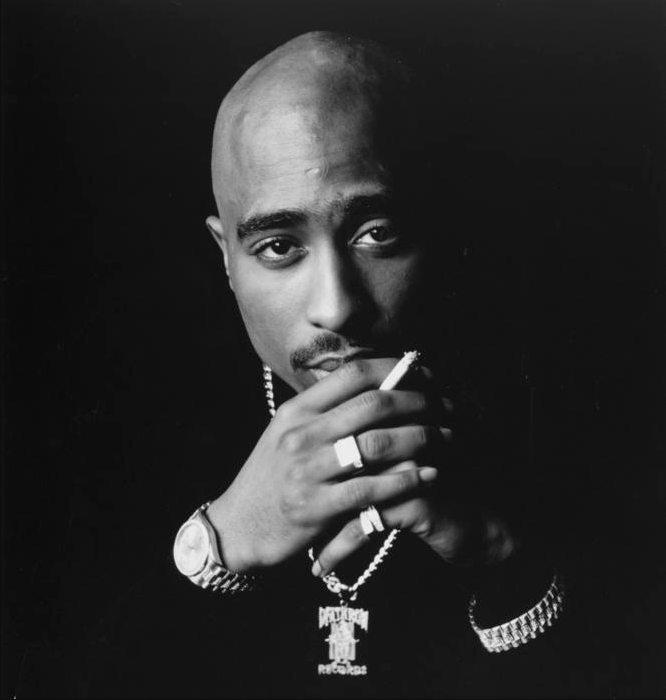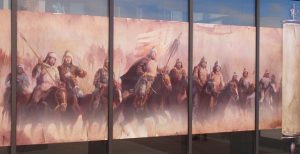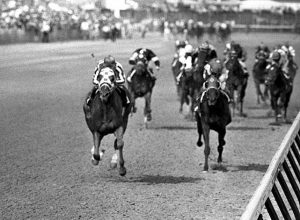Tupac Shakur, a rapper in the 1990s, was known as a legend in the hip-hop and R&B industry for creating impactful music that told a story.1 Every single song he wrote was focused on social and cultural issues, such as gang violence, drugs, childhood struggles, and loss of loved ones, which is why he was successful from the beginning of his music career. Although he was successful, he had a lot of challenges that came with his lifestyle, including run-ins with the law for battery and sexual assault. He had a code that he honored so much that he even had it tattooed across his pelvis: “Thug Life.” This code, along with the hard life he lived, didn’t bring much ease to his situation with the law.2 Although Tupac had his troubles, his music was his escape and his motivation to overcome the obstacles that were set for him.
The first album Tupac released on his own was 2 Pacalypse Now in November of 1991.3 It was a hit from the start, reaching the top of the Billboard charts, and it didn’t take long for it to go gold, making this album his first solo debut as a rapper. He knew what he wanted and he was going to get to the top no matter what. In an interview with Vibe, he stated, “I never went to bed. I was working it like a job. That was my number one thing when I first got in the business. Everybody’s gonna know me.”4 However, with the start of his stardom and fame in music began the start of his journey living the “Thug Life.” He was constantly asked why he chose that lifestyle and why he chose to be a “thug.” His response was, “Because if I don’t, I’ll lose everything I have. Who else is going to love me but the thugs?”5

His music and his lifestyle attracted a lot of attention: good attention as well as bad. The good attention focused on the stories that were told by his music, stories that people could relate to as well as stories that other people couldn’t bring themselves to talk about. The bad attention came from authority figures who thought his music was undermining them and promoting violence among young adults listening to his music. One song that was criticized was “Brenda’s Got a Baby,” which listeners and authority figures thought contained too many explicit lyrics, overshadowing listeners’ judgment and interpretation of the song. In fact, the song was based on a newspaper article about a man who impregnated his cousin Brenda, whose name appears in the title of the song. She was only twelve years old and she tried to get rid of the baby girl by throwing her in a trash can. The song raised objections from the public because of the way it seemed to condone and praise the actions of Brenda.6 Most of Tupac’s songs were inspired by incidents in his life that turned into musical hits. This is how talented he was. He used his own struggles and the struggles of other people, turning them into songs that people could relate to.
Sadly, several days after Tupac released his second album Strictly 4 My N.I.G.G.A.Z in 1993, he was arrested on a sexual assault charge of a teenage girl in New York.7 The young girl was attacked in the Manhattan hotel where Tupac was staying. The girl that he allegedly raped had been previously in a romantic relationship with Tupac. She accused Tupac and three of his friends of abuse, and this was his first major run-in with the law. Most of the charges were dropped, except for the sexual assault charge. He was released on bond and later sentenced to a year and a half to four years in prison. Tupac served his sentence in New York’s Riker’s Island Penitentiary.8
Some people believed that this would be the last they would see or hear of Tupac. Little did they know that this would be his moment to shine. While incarcerated, Tupac decided to put his “Thug Life” behind him by saying, “If Thug Life is real, then let somebody else represent it because I’m tired of it. I represented it too much.”9 This turning point in his life wasn’t the only good thing that happened to Tupac while he was locked up. During this time, his third album, Me Against the World, which was released in 1995, started moving up the charts and ended up at number one. This album wasn’t like the others; it captured a new side of Tupac, portraying his poetic side, and showing the compassion and gratitude he had towards life.10 Not only was the album a hit, but his song “Dear Mama” reached top ten on the singles charts.11 The song was dedicated to his mother, Afeni Shakur. It was a very touching song that told the story of how Tupac grew up, as well as the sacrifices his mother made for him in the absence of his father. He also talked about how he turned to the streets, to drugs, and to violence to fill the void left behind by the absence of his father.12

After Tupac served eight months of his sentence, Suge Knight from Death Row Records paid a $1.4 million dollar bond to have Tupac released from prison. As soon as he was released, he was flown to Los Angeles to sign a contract with Death Row Records.13 However, signing with Death Row made his vow to change his lifestyle difficult for him. He was caught in the feud between the East Coast and the West Coast. This feud was mainly between the record labels Death Row and Bad Boys. The feud contained a lot of taunting and talking bad about each other through songs. It was their way of proving which record label was better at the time. They used personal vendettas to get to one another through song by exploiting personal facts about each other’s lives. There was a lot of going back and forth, as well as the occasional scuffles they’d get into when they would see each other in person.14
After signing with Death Row Records, Tupac released his first double album, All Eyes on Me, in 1996. It didn’t take long for the album to go platinum. This album came with another big hit song, “California Love.” Another hit from the album was “How Do You Want It,” which also reached number one in pop and R&B charts. This album talked about the time he spent incarcerated, his feud with the East Coast, and his love-hate relationship with women.15

Between signing with Death Row Records and the feud going on with the East Coast and West Coast, Tupac started to show his dissatisfaction with the hip-hop and R&B industry. He began to realize that his music career was his downfall, that it was where his troubles all started.16 On September 7, 1996, Tupac Shakur was shot after leaving the Mike Tyson vs. Bruce Seldon fight at the MGM Grand Hotel in Las Vegas. He remained alive for a week before his condition worsened, and he passed away on September 13, 1996.17 With his death he became even more famous. Death Row released the album he was currently working on at the time of his death, proving that Tupac’s legacy would still go on through his music even though his life was over.18 To this day, Tupac is still one of the most influential rappers who has ever lived. His music was much more than just rap. It was, and continues to be, the story of his life, which was a life that influenced people around the world and gave people music that they could relate to.19
- Baker’s Biographical Dictionary of Popular Musicians Since 1990, 2004, s.v. “2pac,” by Shawn Gillen. ↵
- St. James Encyclopedia of Popular Culture, 2013, s.v. “Shakur Tupac (1971-1996),” by Pierre-Damien Mvuyekure. ↵
- The Scribner Encyclopedia of American Lives, 2001, s.v. “Shakur, Tupac Amaru,” by Louise Continelli. ↵
- Contemporary Black Biography, 1997, s.v. “Shakur, Tupac 1971-1996,” by Simon Glickman. ↵
- The Scribner Encyclopedia of American Lives, 2001, s.v. “Shakur, Tupac Amaru,” by Louise Continelli. ↵
- Encyclopedia of African American History, 2010, s.v. “Shakur, Tupac,” by Aaron D. Sachs. ↵
- The Scribner Encyclopedia of American Lives, 2001, s.v. “Shakur, Tupac Amaru,” by Louise Continelli. ↵
- Contemporary Black Biography, 1997, s.v. “Shakur, Tupac 1971-1996,” by Simon Glickman. ↵
- The Scribner Encyclopedia of American Lives, 2001, s.v. “Shakur, Tupac Amaru,” by Louise Continelli. ↵
- Baker’s Biographical Dictionary of Popular Musicians Since 1990, 2004, s.v. “2pac,” by Shawn Gillen. ↵
- Contemporary Black Biography, 1997, s.v. “Shakur, Tupac 1971-1996,” by Simon Glickman. ↵
- St. James Encyclopedia of Popular Culture, 2013, s.v. “Shakur Tupac (1971-1996),” by Pierre-Damien Mvuyekure. ↵
- The Scribner Encyclopedia of American Lives, 2001, s.v. “Shakur, Tupac Amaru,” by Louise Continelli. ↵
- St. James Encyclopedia of Popular Culture, 2013, s.v. “Shakur Tupac (1971-1996),” by Pierre-Damien Mvuyekure. ↵
- Baker’s Biographical Dictionary of Popular Musicians Since 1990, 2004, s.v. “2pac,” by Shawn Gillen. ↵
- Encyclopedia of African American History, 2010, s.v. “Shakur, Tupac,” by Aaron D. Sachs. ↵
- Baker’s Biographical Dictionary of Popular Musicians Since 1990, 2004, s.v. “2pac,” by Shawn Gillen. ↵
- The Scribner Encyclopedia of American Lives, 2001, s.v. “Shakur, Tupac Amaru,” by Louise Continelli. ↵
- Angela Ardis, Inside A Thug’s Heart (Kensington: Kensington Publishing Corporations, 2004), 207-208. ↵



88 comments
Makenzie Santana
The Legendary Tupac shaped music and others with his songs. He talked about actual real life things, always having something to say. He diddn’t create music talking about basic things, he talked about real problems that “thug life” represented and even made it public saying he didn’t want to be apart of it anymore after doing time in jail. He moved on to bigger and better things for himself. He has quite a story, one which i’m already familiar with but very much enjoyed reading about it again with this article.
Vanessa Sanchez
Tupac was a very famous rapper back in the 1990s. Every song that he had created, was all based on real life events in his life that made him famous in the rap industry. He had every song that everyone can more than likely relate to, whether they can talk about it or just keep to themselves. This articles just shows what he did in his life how he became successful in the music industry. Even though his life was taken, doesn’t mean his influence ends, it still continues til this day. This article was an interesting one to read because it shows the timeline of his life and of what he had to go through.
Emmanuel Leonard
I’ve always admired Tupac as an artist, but I’ve also realized that his life as a “thug” overshadowed the good he has done through his music. He went to jail on sexual assault charges which I understand is not a good look on is record, but it really does seem like his time incarcerated changed him for the better, as he basically renounced his dedication to being a thug, and instead used his experiences to help people see that they can change just like he did.
Erika Jackson
I honestly did not know much about Tupac. I knew him from his music and how he was considered a legend in hip-hop and R&B music. I did not know about how he considered himself a “thug for life” and how that thinking and lifestyle affected his music and his lyrics in his song. I also did not he was involved in the feud between the West and the East. I wonder if he got shot because of his last album becoming so big while talk trash about the East side.
Cameron Lopez
Reading this article was a reminder to myself. I knew his music spoke to people and connected with them in many ways. To read an article for once about only 2Pac and his rise to fame is great. No reference to his rivalry with Biggie Smalls. It focuses purely on his music and how it spoke to people so closely that it was life changing. It was nothing but 2pac and the truth, about his code “Thug life” and its background and meaning.
Sarah Uhlig
I didn’t know about this artist or his music, but he seems dedicated to his music and passionate about it. It is unfortunate that he sexually assaulted others during his life, so I didn’t grow to like this artist through the article. although, the story of his success and how he changed the music industry is something to look up to him for, especially how he related to social issues and other topics important to society. Now that is something really cool.
Andres Cano
Being a big fan of Tupac and his music, I found this article to be especially interesting because of his renown personal code “Thug Life” and the context behind it. Listening to his music I have always thought that his words were actually empowering to women, probably because he seemed to sympathize and understand the struggles that women face. Despite the fact, I will never know the truth behind his charges of sexual assault, but I can say that this article brought to light the struggles of living his “Thug Life”.
Samire Adam
To read all about Tupac and his life story without his feud with Biggie or his death overshadowing the article is amazing. I love how the article really focuses on his music and the reactions made because of his lyrics is really eyeopening and to see that he really changed the game in the music industry is astounding. I love how the article didn’t focus on the bad, but the truth.
Esperanza Rojas
This was such a good article. I, personally, don’t listen to tupac all that much but I do know that people praise him for the message he was sending, which was to stand up for your generation against the wrong and bring light to the injustice. But I never knew he went to prison so many times, and especially one of the charges was sexual harassment. And it was interesting that he got even more famous after each time he came out of prison.
Antoinette Johnson
I love Tupac. He was an inspiring artist. A lot of people say that rap causes people especially the younger generation to do stupid things. That causes people to do drugs, and get involved with violence. Hip-Hop is culture. Tupac speaks from where he’s from and what he has seen. Through his music he gives us the real deal on the streets, not the thing other people tell us to keep us quiet. Tupac is a legend and he will always be one of the best Hip-Hop artist. He lived his Thug life by being a real hero.